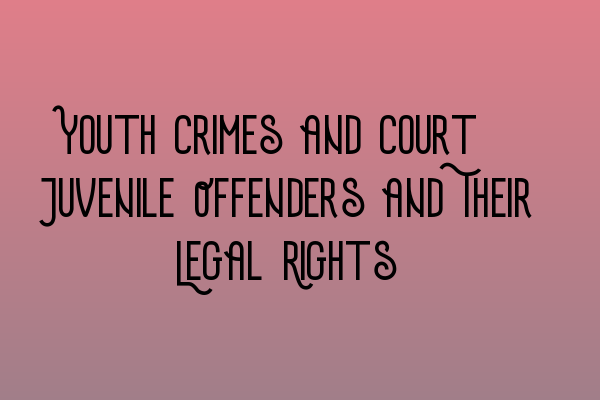Youth Crimes and Court: Juvenile Offenders and Their Legal Rights
When it comes to youth crimes and court proceedings, understanding the legal rights of juvenile offenders is crucial. Juvenile offenders are individuals who are under the age of 18 and have engaged in criminal activities. This article will delve into the legal rights of juvenile offenders and provide insights into how the youth court system operates.
Legal Rights of Juvenile Offenders
Just like adults, young offenders have certain legal rights that protect their interests during the court process. Some important legal rights for juvenile offenders include:
- Right to Legal Representation: Juvenile offenders have the right to legal representation. It is essential for youth facing criminal charges to have a qualified solicitor who specializes in criminal law to ensure their rights are protected.
- Right to Be Informed: Juvenile offenders have the right to be informed about the charges against them. They must understand the nature of the offense and its potential consequences.
- Right to Be Heard: Juvenile offenders have the right to be heard during court proceedings. They have the opportunity to present their side of the story and express their opinions.
- Right to Privacy: Young offenders have the right to privacy during court proceedings. The information about their case should not be disclosed to the public or the media, as this may harm their future prospects.
These legal rights ensure that the justice system treats juvenile offenders fairly and appropriately. The aim is not only to punish but also to rehabilitate and reintegrate young offenders back into society.
How the Youth Court System Works
The youth court system operates differently from adult court systems, taking into account the age and unique circumstances of juvenile offenders. The main objectives of the youth court system are:
- Rehabilitation: The primary aim of the youth court system is the rehabilitation of young offenders. The focus is on providing guidance, support, and opportunities for young people to grow and change their behavior.
- Education: The youth court system emphasizes the importance of education and ensuring that young offenders are given a chance to continue their studies.
- Guardianship: The court recognizes the role of parents or guardians in the lives of juvenile offenders. They may also be included in the court proceedings to ensure the best interests of the young person are taken into consideration.
The process of the youth court system typically involves the following steps:
- Arrest and Police Interview: If a young person is suspected of committing a crime, they may be arrested and taken to the police station for questioning. During this time, they have the right to legal representation.
- Diversion: Depending on the seriousness of the offense, some young offenders may be offered diversion programs instead of going through court proceedings. These programs aim to divert them away from criminal behavior.
- Court Proceedings: If the case proceeds to court, the young offender will appear before a youth court. The judge or magistrate will consider all the evidence and may impose sanctions or rehabilitation measures.
- Sentencing: If the young person is found guilty, they may receive a range of sentences, including community service, probation, or a rehabilitation program.
It is essential for young offenders and their families to seek legal advice from experienced solicitors who specialize in juvenile law. They can provide guidance and support throughout the court process, ensuring that the best interests of the young person are protected.
Conclusion
Understanding the legal rights of juvenile offenders and how the youth court system operates is crucial for anyone involved in such cases. By being aware of these legal rights, young offenders can ensure they are treated fairly and receive appropriate guidance and support. If you require legal representation or advice for a juvenile offense case, our team of expert solicitors at SQE Criminal Law & Practice Law UK is here to help.
For more information, check out these related articles:
